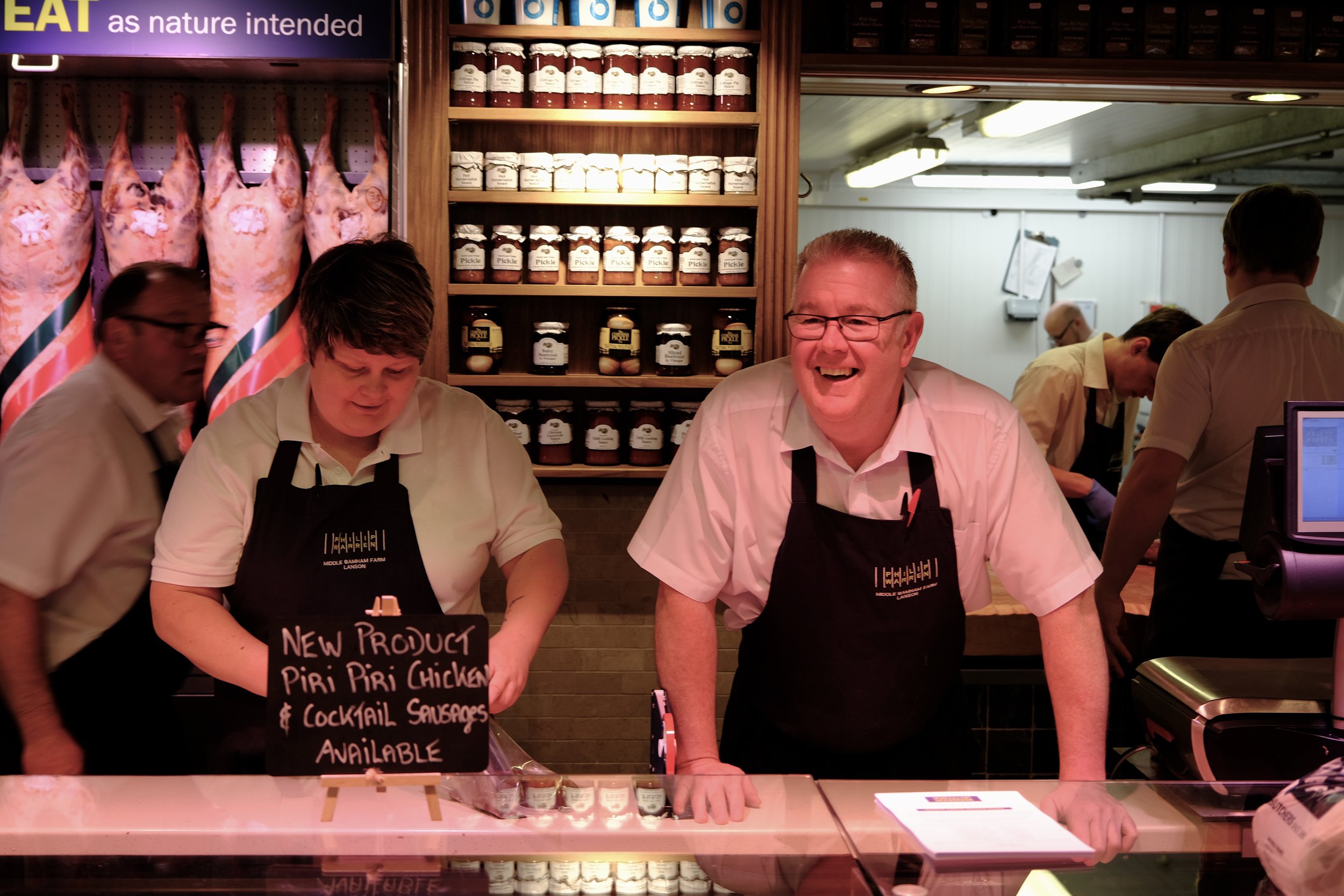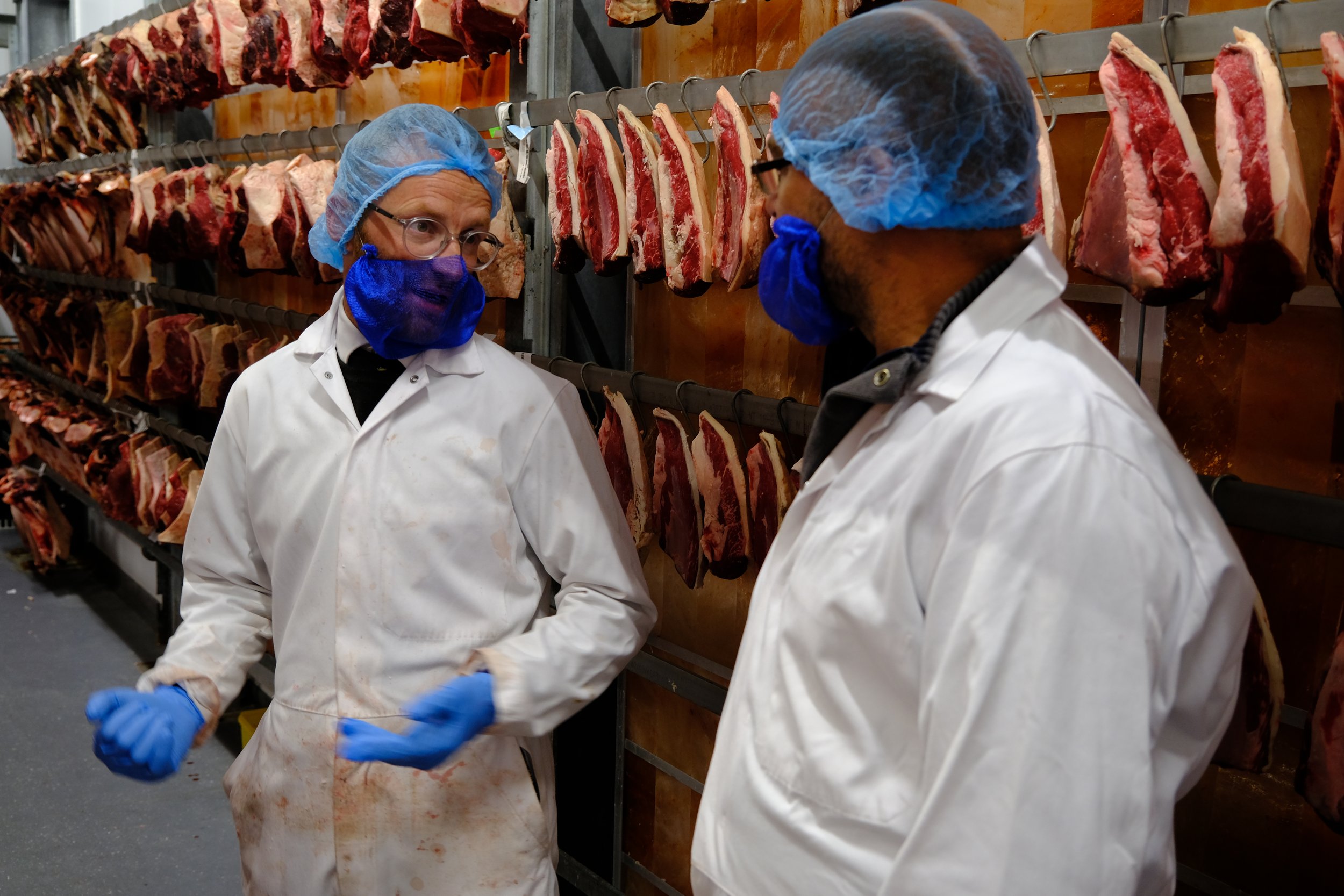The Waiting Game: Ian Warren of Philip Warren & Son Butchers
Farmers always seem to drive fast. You might have experienced it: strands of bailor twine, tubs and tools, in fact, the entire contents of their car – dog, driver and cursing passenger – all soaring airborne as potholes swallow the tyres at 80 miles per hour.
I have a hunch that this erraticism is a symptom of high-intervention, human-dependent modern farming. You must be everywhere, all at once, or watch your farm wither into oblivion. Passing the Tor’s of Dartmoor in a car driven by mutton farmer Matt Chatfield was, however, anything but this classic tale of turmoil. Out here, there’s a different approach; one which I like to think is neatly epitomised by a drive in a 4×4 that didn’t leave me picking bits of my teeth off the floor.
When an innocuous car park in Launceston, Cornwall, ended our journey I was pleasantly greeted by dense wafts of Cornish pasties floating through the rainy air. The source of the smell, a local butchers shop, was our terminus.
If you happen to be a local, or au courant with London dining establishments, then odds are you’re well acquainted with this name: Philip Warren & Son Butchers. They are at the height of their game, winning Britain’s Best Butcher’s Shop, and show no sign of slowing down – whilst simultaneously refusing to speed anything up.
Ian works with some 120 similar independent farmers in the South-West dotted across the moorlands and grasslands, whilst also operating farms himself.
Ian Warren, the son of prodigious butcher Philip Warren, now runs the business to great fanfare. Ian started washing dishes for his dad at just 6 years old, yet he didn’t think he’d go into the family business. ‘My dad was always telling me to go to school, to always pay attention; exactly what I tell my kids now. I was doing engineering at UCL, but spent too much time on the piss and ended up a butcher.’ Ian laughs, then continues, a little more seriously: ‘When I came back from university, I really believed that London was special, that going to a place like Harrods was special. Dad would tell stories about sneaking onto wagons headed to Smithfield’s as a kid, and tell me how special that place was. I thought why can’t everywhere have that: a unique destination that has the best all in one place?’
The thought wormed around Ian’s mind. A silence followed, and the fleeting buzz of the A 30 outside his office took a hold of the room: the ancient road, like most in England, leading directly to London. ‘I knew my dad was one of the best. He just needed some recognition.’ Ian breaks in. ‘Then Matt turned up in 2008. He told me that he wanted to bring Cornish food to London, along with all these other crazy ideas about sheep. Dad had challenged me a few times about how I was going to grow the business, so I started working with Matt on getting our produce to London – and then later, on his Cull Yaw mutton.’
Cull Yaw mutton was one of Ian’s first big hits, despite its initial challenges: ‘When I told dad we’re going to try sell mutton to big kitchens he wasn’t best pleased. After a year went by, and it still hadn’t gathered steam, he really started challenging me. Matt convinced me to give it six more months… and at the last minute it worked out.’
Ian works with some 120 similar independent farmers in the South-West dotted across the moorlands and grasslands, whilst also operating farms himself. Despite working with so many producers Ian points out that the numbers are declining. UK dairy farms alone have dropped from 196,000 in 1950, to just 11,900 in 2020. Yet has output declined? No, it’s increased. Farms have become huge agglomerated machines churning out standardised produce to meet supermarket requirements.
No wonder the Warren name is first choice for Michelin Star kitchens and locals alike.
I ask Ian why, if efficiency is so achievable with an industrial approach, they haven’t given in to the encroaching tide. ‘There’s so many farms, like Matt’s, like my sister’s and her husband’s, that cannot be commercial – it’s out on the bloody moors in the peat and granite! They can produce a really good animal on that land, but it doesn’t suit the commercial market. They farm native cattle, send them out onto the Tor’s, and have very low-input. This is the way it has to go, low-input, if we want to produce properly on the land we have here.’
What Ian does might not be anything new. In fact, it’s old. It’s dated. But it’s not outdated. It’s a way of farming that has only ceased to exist since the rise of corporate supply chain giants. Explaining further, Ian says, ‘We’re taking these products that have huge natural variation, that are completely unsuitable for supermarkets, and making them our niche. No one else is buying this stuff because it’s too prone to fluctuations. The best kitchens, however, can see the quality is all there, and they work the variation in flavour and size to their means.’
If this dedication to heritage and locality wasn’t enough, Ian’s team is built on the same philosophy. ‘We employ a lot of young lads from the area. Cornwall is a really deprived place so I want to support them, give them a skill.’ Ian then elaborates, impassioned. ‘The whole idea of family run… I seriously care about it. If someone is having a hard time, or seems disinterested, I want to hear from them. I don’t want to see anyone leave and feel like I haven’t tried to bring them into the fold. My dad always worked to be the best, and I want to be thought of with the same respect.’
One step into Ian’s shop shows he’s achieving his goal. Customers and staff swap jokes, jostling each other companionably for chops and cuts, bantering and piping up with lines relating to me like, ‘Who’ve we got here today then’, and ‘Oh here we go, is this another London one?’ These jests not only reflect the friendliness of the community, but prove there’s an influx of interest from the capital arriving at this otherwise unassuming butchers shop.
Some of this attention is surely arriving as a result of Ian’s opinions towards his profession. ‘I believe we should be eating less meat. Standardisation won’t tell you this, but better reared meat means you can have smaller portions. And, you know, one of the best things that ever happened to me was the rise of veganism. It made people ask questions. Where is meat coming from? How is it treated? Is it sustainable? This really helped us because we’d spent years pushing for transparency in the industry.’
Ian’s admirable mindset solidifies his business as the antithesis of meretricious. No wonder the Warren name is first choice for Michelin Star kitchens and locals alike. They’re a set of good people, selling good, honest food. Ian doesn’t work with excessive outputs, but instead employs integrity and sustainability. He’s taken the risk of trusting time, trusting slow methods, and trusting that quality Cornish produce will keep a clientele.
Ian took a risk in working with Matt, and still continues to do so in his relationships with other small farmers. Unlike most tales of communities turned into corporate takeovers, this is a story with a happy ending. And in fact, Ian’s mentality extends further than you might think…
Ian is the second feature in our ‘The Waiting Game’ farm-to-table trilogy, which will be released over the coming weeks. View the first story about Matt Chatfield here. View the next story here.





